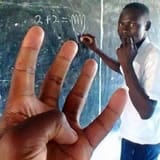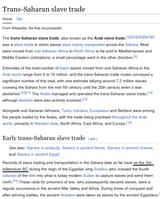When was the first time that blacks were taught math and why did they teach them math? I notice that they struggle with math, is that because of socio-economic factors, cultural differences, or something else?
>Sub-Saharan African cultures developed diverse numerical systems, with base 5, base 10, and base 20 being the most prevalent. These systems often reflect natural patterns like the five fingers on a hand and the ten fingers of both hands, or the use of fingers and toes (base 20). Some systems also incorporated body parts for counting, with specific terms for numbers derived from parts of the body, such as fingers and toes.
>The specific number systems used in different parts of Sub-Saharan Africa were influenced by the cultural context, including the types of activities (e.g., trade, agriculture), the social structures, and the available resources. For instance, communities with limited need for large numbers might have simpler counting systems.
They taught themselves math anon
>>17912329counting numbers isn't math
They were taught math so they could keep track of lashings by the patrollers.
>>17912332>counting numbers isn't mathYou're one of them special needs fellers ain't ya?
>>17912332Neither is arithmetic or any other kind of computation.
https://cstem.charlotte.edu/wp-content/uploads/sites/267/2023/05/Jimmie-Powell-African-Mathematics.pdf
https://www.sciencedirect.com/science/article/pii/S0315086084710299
Many African societies knew basic math before colonialism.
I mean, math has likely existed for as long as mankind has existed.
The Yoruba for example use base-20, often expressed through subtraction and addition in phrase form like “ogún-dín-lógún” (twenty less one from forty) for 39. Similarly, the number “400” in Yoruba carries the same connotations as “1000” or “1001” does in English for a vast yet unspecified quantity.
In various languages like Dagaare, number systems are actually different depending on what class of thing is being quantified.
Systems like the Ethiopian 13-month calendar combine solar and lunar cycles with precise leap-year corrections.
Circling back to the Yoruba, the Ifá divination system is notable because it’s essentially a pre-modern, culturally embedded binary system that predates Western binary mathematics by centuries, and it’s still in active use. Ifá uses two possible marks (open vs. closed, one vs. two, short vs. long), recorded in paired vertical columns during divination. Each “throw” produces a binary-like outcome, think of it as 0 or 1, though in Ifá’s own symbolism they have sacred names and meanings. Eight such binary “bits” form a pattern called an odu. With 8 binary positions, the number of possible combinations is: 2^8 = 256. Those 256 odù are complete and exhaustive: no two are the same, and together they form the full divinatory “universe” of possibilities. Mathematically, this is a perfect example of a finite, closed system based on permutation. The 256 odù are organized as 16 “principal” odù, each with 16 derivatives. This is essentially a base-16 (hexadecimal) hierarchy nested within a binary framework. It allows a priest to navigate quickly between general categories and specific variations, a structure not unlike decision trees or indexed data storage in computer science. The process of interpreting Ifá is rule-based and algorithmic.
>>17912359Anon, sending actual knowledge in some pathetic third worlder's race bait thread is pretty cool.
>>17912344>that papernorth africa and egypt... not black africans.

Untitled
md5: 7d2531177a7f3f6d85a62e6bf5bc70b3
🔍
>>17912344>that papernorth africa and egypt... not black africans.
>>17912466The rigid binary between “black africa” and “north africa” isn’t really a thing. Especially as you go back in time. Deep intercourse between black and caucasian populations has been a thing since antiquity.
For example, the skeletons we find in what used to be the “Green Sahara” are a mixture of “Black” fishermen and hunters and miller farmers with “White” cattle herders.
Such intercourse is the reason why the “caucasoid” Fulani speak a Niger-Congo language, but the “black” Hausa speak an Afro-Asiatic language. Traditions of mummification for another example were shared between “Black” and “White” populations that would eventually funnel into the Nile Valley as the Sahara dried up.
>>17912616>Especially as you go back in timeyou can go back at least as far as 3,000 BC, 5,000 years ago, and find that since then blacks have been caught from the wilderness and sold off as slaves to work in white civilizations. That includes Egypt and north Africa.
>>17912323 (OP)>cultural contextIt do dus be in dhey kulture doh!
>>17912684I’m not sure how that changes the point.
We are well aware of human migration and intercourse between what we call “Black” Africa and “White” Africa in history and prehistory.
>>17913080It's some sperg who gets offended at the idea of implying blacks and non-blacks not having a totally one sided adversarial dynamic. Apparently he thinks Egypt didn't have enslave their own, or that Africans further south didn't have their own kingdoms and states alongside their own free and slave labourers.
>>17913071Fucking caveman, type normally


